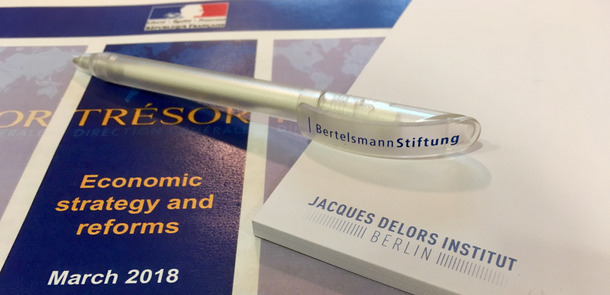How can Europe put a definite end to the euro crisis?
How can Europe put a definite end to the euro crisis? In the pilot study Repair and Prepare: Strengthening Europe's Economies after the Crisis, Bertelsmann Stiftung and Jacques Delors Institut - Berlin develop a roadmap towards a sustainable Economic and Monetary Union (EMU) and identify crucial questions that need to be answered on the way.
The idea is to provide strong incentives for all euro-area member states (as well as willing EU member states outside the euro area) to implement structural reforms and commit themselves to an enhanced and more integrated monetary union. Given that the current political environment will render difficult any long-term reform process lacking immediate benefits, the roadmap is accompanied by a modernisation pact that focuses on smart debt reduction and a coordinated investment initiative. Moreover, the study identifies "known unknowns," thereby providing a clearer view of questions that need to be answered as Europe moves towards a more resilient monetary union. It outlines which areas need to be researched in more detail.
Our proposals were the topic of a high-level workshop on 28 November 2014, featuring László Andor, Jörg Asmussen and Wolfgang Schüssel. In a debate under Chatham House rules, policymakers, academics and journalists were invited to share their view on our findings and the right way forward. Their comments focused on five topics: The status quo, the possibility of an exit from EMU, differentiated integration, long-term goals and short-term measures. The debate vividly illustrated the problems facing efforts to reform EMU. As one participant put it, an "intellectual divergence" stymies progress. While there are numerous reform proposals, even experts cannot agree which elements are truly indispensable for a functioning monetary union and should be prioritised. The problem is compounded by a lack of basic political consensus on the adequate cost euro area member states should be prepared to pay for a stable EMU. At the same time, academics and policymakers alike agree that the current compromise is highly susceptible to renewed crisis. Even in the face of an ever-growing "crisis fatigue", extensive further research and public debate may therefore be both inevitable and indispensable.
The study was produced within the framework of a new cooperation project on reforming economic and monetary union so as to enable European economies in all their diversity to develop the necessary amount of common ground which is required for competitiveness and sustainable growth. Moreover, social consequences and democratic deficits of previous economic decision-making structures must be considered and decisively improved. The Bertelsmann Stiftung works on these questions in the context of different other projects.




